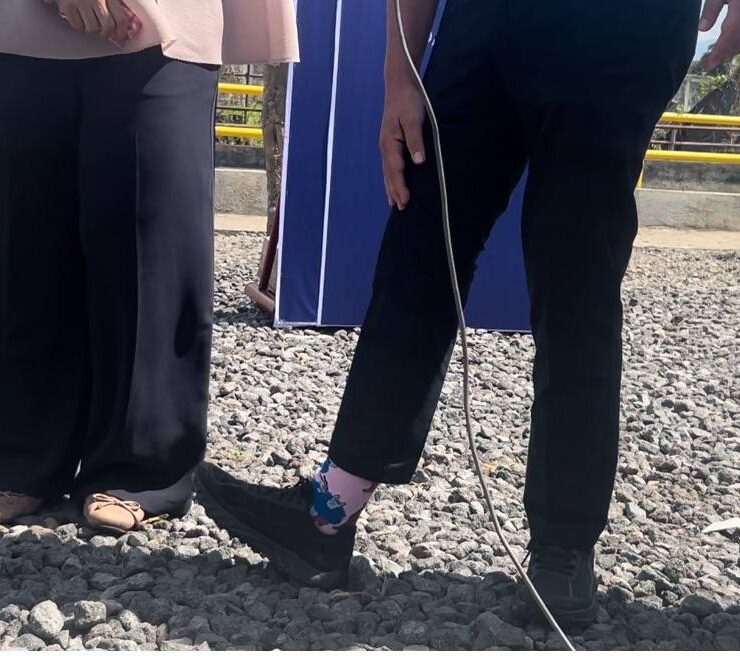In losing her hearing, Lani Misalucha rediscovers her voice

At the piano, Lani Misalucha, accompanied by musical director Toma Cayabyab, sang her evergreen hit, “Bukas na Lang Kita Mamahalin,” in a way only she could.
A virtuoso of vocal dynamics, she manipulated volume and intensity, slipping from resonant belts into tenderly caressed notes within the span of a word. Her agility, meanwhile, meant she could seamlessly travel across different registers—chest, mixed, head, falsetto—to better express the ballad’s ebb and flow of emotions.
And when the aching final passage was sung, the intimate crowd that had gathered around her at the Discovery Suites lounge swelled with heartfelt cheers and applause. It was Misalucha, true to form.
Listening to that richly textured performance, one would be hard-pressed to guess that just a few years ago, she didn’t even know if she would ever be able to hear—much less sing—ever again.
Not one singer, even the greatest of them, can escape the inevitable vocal decline over time. Misalucha, at 55, still has hers intact. But what if it were her ability to hear that she lost—and in such devastating circumstances?
In 2020, Misalucha and her husband contracted bacterial meningitis, a serious—possibly fatal—infection that causes swelling around the brain and spine. While the couple couldn’t be more thankful that they pulled through, the ordeal left them with lingering complications, including hearing loss, tinnitus, and vestibular issues.
Forget about singing for now. “How could I even function on a daily basis?” she wondered.
Static and distortion
The first day out of the hospital—and the year that followed—proved to be the most draining in every sense of the word. She could barely hear the sound of her own voice, as if she were covering her mouth whenever she spoke. High frequencies—the clinking of cutlery, the jangling of coins—were auditory assaults. Low tones mostly went by unnoticed.
Her world, once filled with beautiful melodies, now hissed and crackled with static and distortion. The slightest movement sent her head spinning and her eyes darting. “‘My God, is this how I will live the rest of my life?’ I asked myself,” Misalucha told Lifestyle.

In December of that year, the singer returned to the stage for a Christmas special on “The Clash,” a singing contest where she sits as judge to this day. Some once-routine notes veered off pitch. The worst part? She couldn’t even tell that she had gone out of tune.
“I was backstage, trying hard not to cry,” she said. “I didn’t want to sing anymore. How could I, when I couldn’t even hear myself?” Imagine a painter suddenly being unable to see color.
Although her condition somewhat improved over the following years, she never fully regained her hearing. She remains deaf in her left ear; her right ear works, but feebly so. But maybe that would do, she figured, better than having nothing at all. Despite her initial doubts, her passion for music, come hell or high water, endured.
Acceptance
But if she were to continue doing what she loves most, Misalucha knew she had to take the first important step: acceptance. “I told myself that this is my current state. I have to deal with it and work around it,” she said. “If this is the only resource I have, then I have to make the most out of it.”
Misalucha had no choice but to rethink her approach to singing. She needed to sharpen what remained of her hearing. Regular practice and vocalization were a given. The toughest challenge, however, was staying on pitch. With impaired auditory cues, she had to rely mostly on muscle memory, almost as if she were trying to visualize the tones in her mind.
“At first, I was practically guessing all the notes. No kidding!” she said. “The sound I hear isn’t precise, so when I try to hit a low note, it feels like I’m landing a semitone under. And when the instrumentation builds—vocals, instruments, and everything—I feel like I’m hovering just above the right note.”

“It was like I was trying to relearn how to sing, like I was rebooting myself,” pointed out the singer, occasionally leaning in to confirm that she had heard the question correctly. “It was very difficult, to be honest.”
But more than a change in technique or a recalibration of her instrument, what also helped her “triumph over the odds,” she said, was a shift in mentality. “Prayers and meditation work. I also surrounded myself with good vibes and positive people.”
Misalucha has been singing professionally for almost 40 years now—first as a band and multiplex singer, and then as a mainstream recording artist. She has several classics under her belt, sold countless records, and held sold-out concerts both here and abroad.
Resilience
By all means, she has nothing left to prove to the world—except, now, to herself.
This Aug. 21, at The Theatre at Solaire, she will headline a concert called, “Still Lani”—her first major solo outing in years—as “a testament” to the fact “that I can still offer the kind of performances people expect from me.”
Fans can expect the usual trappings of a Misalucha spectacle: pop and classical crossovers, with a sprinkling of jazz and R&B. Maybe she’ll even squeeze in some rock or reggae. “Who knows?” she said, laughing. There will be powerful singing, of course, but she would like to believe that it’s no longer as central to her craft as much as conveying emotions. Storytelling over bombast, so to speak.
Misalucha also hopes to bridge generational gaps by inviting younger music acts such as Ben&Ben and Leanne & Naara, along with theater artists Shaira Opsimar and Paeng Sudayan.
Looking back at her discography, it turns out she has quite a few songs that perfectly reflect her ongoing story of resilience.
There’s “Tila,” part of which goes: “Tila lilipas din ang bagyo / Liliwanag din ang kalangitan / At ang araw ay sisikat nang muli…” Then there’s “I Rise to the Top,” about “risking it all and giving my all” amid life’s biggest battles, playing softly—and fittingly—in the background throughout the interview.
“Sometimes, you feel like you’re no longer relevant. But you just have to dust yourself off and keep it moving,” she said. “Sometimes, I wonder if I still have it in me. Kakayanin ko pa ba? I wouldn’t know if I don’t try.”





















